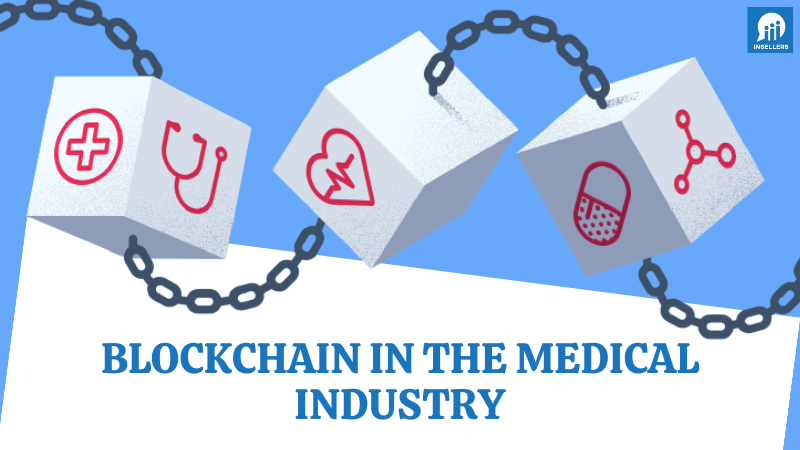Blockchains emerged as a technology for quicker money exchange transfers.
It is an information storage and sharing system that, because of its openness, is reliable. Originally used in digital currencies such as Bitcoin, this technology was later used in other industries, such as insurance, finance, and even healthcare.
“Blockchain is more technically a decentralized, transparent record of peer-to-peer transactions from linked blocks of transactions and stored in a distributed digital ledger, often referred to as a “public digital ledger.
Blockchain technology has been widely applied in the medical industry for the free sharing of information from one place to another. The technology-driven by blockchain unlocks barriers to the sharing of health records and maintains personal security.
Blockchain, the Business Value Institute of IBM, interviewed 200 healthcare administrators and estimated that 16 percent are prepared to introduce a blockchain marketing solution.
The effect of Blockchain on a patient will be substantial:
- Records Exchange
- Mobile Tracking
- Medical Review
WHAT IS BLOCKCHAIN?
Simply put, you can think of Blockchain as your social media page where the data can be accessed by anyone, but the details can not be updated. Using a mixture of blocks before, one block hash is formed, and together it becomes a chain of blocks. This is known as the blockchain.
A distributed storage framework built to be safe is Blockchain. This makes Blockchain suitable for performing tasks such as medical record monitoring and other administrative operations, including the processing of transactions, reporting of origin, voting, identification management, and traceability of food.
We will explain in this blog how the blockchain is revolutionizing the healthcare industry.
HOW THINGS WORK NOW?
In order to maintain patient health records, many healthcare institutions still depend on old structures. In local databases, these out-of-date applications hold patient care information that can make a diagnosis:
- Consuming time
- With the Doctor, difficult
Healthcare institutions use a centralized network to store data, including patient personal records to test reports, and specialist orders.
As the information is stored at a single centralized location, it leads to problems such as:
- Personality Robberies
- Up spamming
- The criminality of financial documents
BLOCKCHAIN’S POTENTIAL IN HEALTHCARE
While few disagree with its promise, blockchain use and implementation are still in their very early stages.
- Speed up Research and Development
- Establish more reliable routes to therapy
- Improving and measuring patient results
Blockchain technology has the potential to transform health care, place patients at the center of the healthcare environment, and strengthen health data security, privacy, and interoperability. By making electronic medical records more effective and secure, this technology could offer a new paradigm for health information sharing (HIE).
Blockchain now has an immense appeal to industry-wide healthcare professionals who need stable and accurate access to the full medical history of a patient.
1. Medical Data Management
One of the main issues contributing to fatalities and ignorance is medical error.
Blockchain will securely allow patient information to be exchanged between health systems, both globally and across borders, and enhance member health management collaboration.
This would reduce the expense and risk of manufacturing, and also encourage medical tourism.
BurstIQ, based in Colorado, USA, uses blockchain to transform the way it shares and uses medical information. The program from BurstIQ allows healthcare organizations to safely manage vast amounts of patient data while maintaining strict HIPAA compliance while allowing:
- Safekeeping Details
- Sale of data
- Data exchange
- Licensing details
2. Drug Development and Supply
More than 10 percent to 30 percent of drugs sold in developing countries are fraudulent, according to the Health Research Funding Organization (HRFO).
TraceRx, a blockchain-based pharmaceutical tracking and counterfeit solution, was developed by LeewayHertz Technology in California, USA. TraceRX helps UNO to track free drug distribution and identify any inefficiencies or losses.
The TraceRX network uses blockchain to deal with the problems of pharmaceutical fraud, recovery, and shipping.
It makes it safer, more transparent, and more secure for the operation. This allows patients to verify the authenticity of drugs before buying or using them.
3.Claims, Billing Management, and Fraud
About 5-10 percent of healthcare expenditures are fraudulent, and the federal government recovered $5.7 billion in health care fraud cases in 2014. Per year, Medicare fraud accounts for about $30 million in damages.
Using a blockchain-based automation technology could significantly reduce claims, payments, and processing times-related admin costs and make intermediaries redundant.
4.Patient & Drug Identity Validation
Blockchain can solve the patient identity fraud problem and can decrease the use of impersonators of false IDs. Since blockchain records are permanent and can be checked, this feature can be used for patient authentication and authentication, reducing the impersonation of patient IDs for the purchase of drugs for drug trafficking purposes. Located in London, the blockchain-based network of Medicalchain:
- Protects the anonymity of outside sources from patients.
- Maintains record confidentiality.
- Maintains records of origin.
- Using blockchain technology, drug recognition can be confirmed.
Using blockchain technology, drug recognition can be confirmed. It would minimize the number of counterfeit drugs being sold by offering transparent information on individual goods.
5.Backing Research & Treatment of Healthcare Data
Smart Contracts
In the organization and communication of studies or clinical trials, there have been several organizational difficulties, as a concerted effort across a wide range of organizations is required. This could lead to intellectual property and dishonesty being violated. By allowing users to authenticate their documents and to provide evidence of existence, the use of blockchain would strengthen this. Researchers will share test results, statistics, and quality reports without fear of intellectual property infringement.
Blockchain-enabled healthcare solution
One of the best examples of this is the exchange and storage of patient medical information and how the main key is in the hands of the patient.
- Information is obtained from patients from health care professionals.
- In current databases, the data is stored.
- From each information source, a hash is created and redirected to the blockchain.
- Who has access to their medical history, the patient determines.
- The blockchain will be consulted by health care stakeholders to gain access to the data.
Benefits of blockchain in the health sector:
Trust, encouragement, and identification are the primary concerns that a blockchain can often have. Blockchain in healthcare has many benefits, such as:
- Simplified Method for Data
- The device’s interoperability
- Effectiveness
- Data Regulation
The Future of Blockchain
Although today’s Blockchain technology is not fully mature, it provides a wide range of healthcare opportunities. The possible applications of blockchain in the health sector are being explored by more and more start-up companies, a sector that should be increasingly incorporated through acquisition operations.
The high demand for electricity for its operation is one of the major disadvantages of the blockchain in its current form. But the solution can emerge in one way or another with time.
An inversion of this model could be seen in the future, with a patient giving the blockchain a single consent, providing information for sharing and exchanging data and clinical care and protection desires, to which they could eventually gain access.
Some functionality can be deployed today, but it must evolve to address future behavioral, technological, organizational, and economic concerns before blockchain can be adopted by organizations globally.
Summary
It can be used in many different areas of the healthcare system, such as the storage and sharing of medical information and insurance papers, both in health centers and in smartphone devices and remote surveillance systems, as well as in clinical trials, as the blockchain improves privacy and accessibility. There is currently little research on blockchain applications for healthcare, but more research is available every day. Blockchain is one of the most successful areas of currently underway blockchain research that will transform the health hierarchy by restoring the patient’s control over medical records and health data. This shift in authority will lead to an overall shift towards medical-centered care; the patient blockchain revolution is just beginning.
Company blogs and many more visit insellers for more such stories about new technologies.
The post Blockchain in the medical industry appeared first on Crazy About Startups.






![Read more about the article [Funding alert] BYJU’S raises $50M led by India Infoline and Maitri Edtech](https://blog.digitalsevaa.com/wp-content/uploads/2021/06/byjus3-1597676966761-300x150.png)




